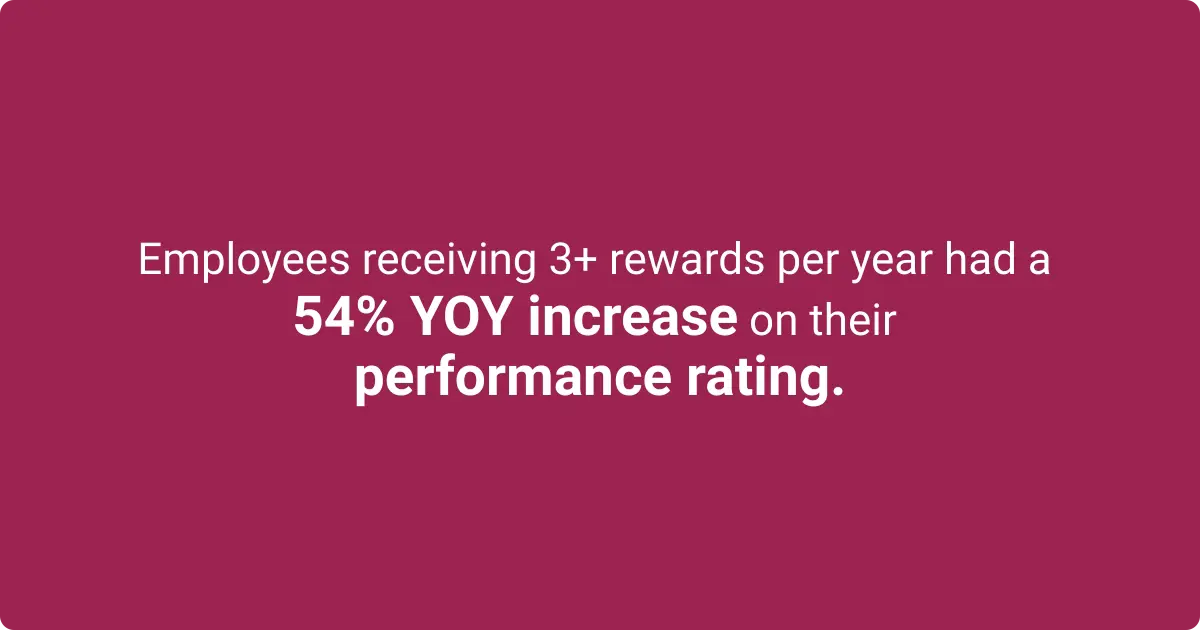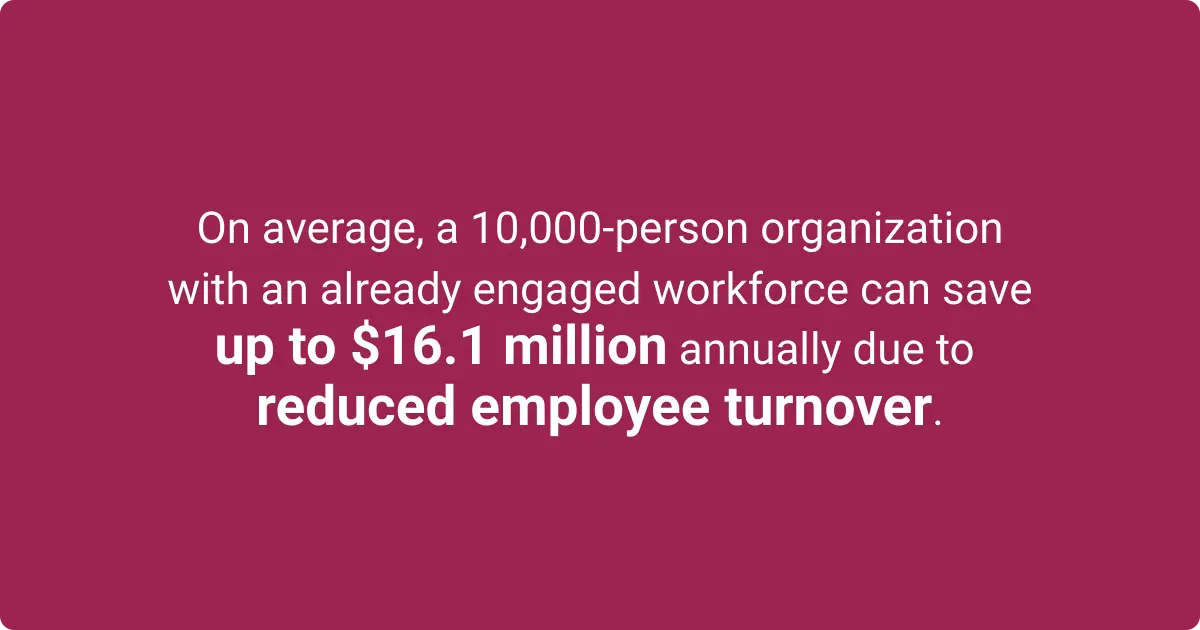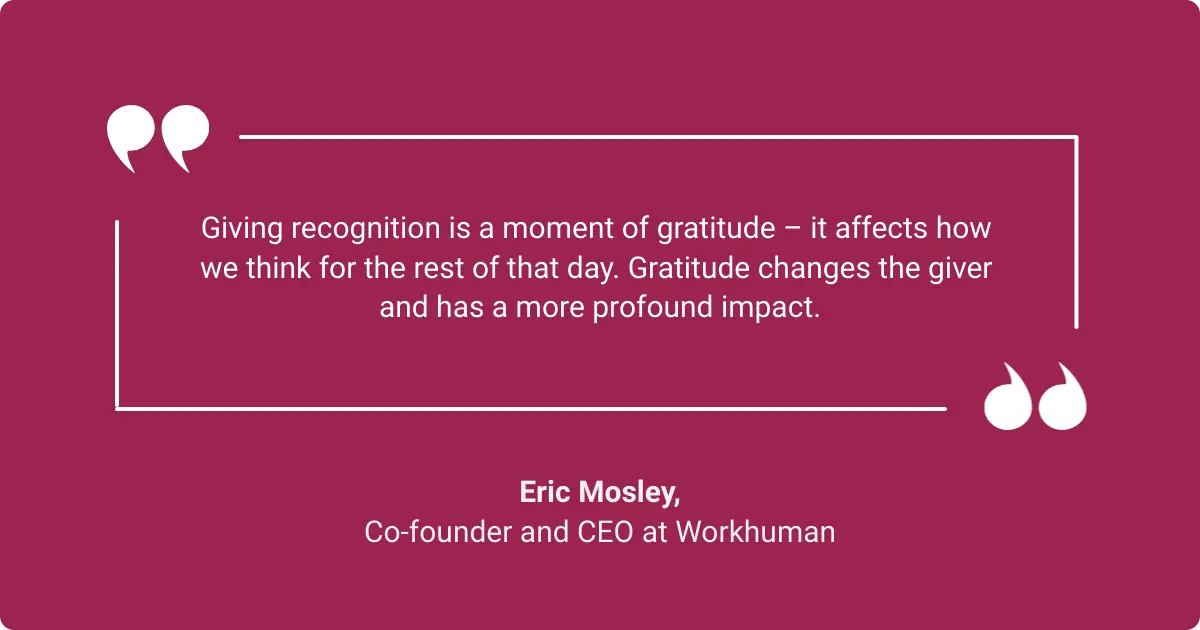Gratitude at Work: The Science Behind Success

When we talk about gratitude, we often talk about it being “bone-deep”. As it turns out, the science of gratitude shows that metaphor is pretty accurate. Gratitude has a deep impact on both emotional and physical wellbeing, making it a powerful cornerstone in work culture and beyond.
Researchers of gratitude define it as: “an emotion which occurs after people receive aid which is perceived as costly, valuable, and altruistic,” or “an emotion that (is) directed towards appreciating the helpful actions of other people,” or even “appreciation of one’s abilities, or of a climate in which such successful work (is) possible.”
Gratitude has been shown to improve mental health, making for happier, more optimistic people. Under this influence, workplaces become more positive, experience less stress, and demonstrate improved teamwork and helpfulness. It also leads to fewer missed days and better physical health.
People who practice and receive gratitude also communicate better, have improved recall, and are generally more resilient. All of this adds up to an engaged, productive, and supportive team.
Social recognition is one of the best ways to inspire gratitude in the workplace. According to a study with Workhuman and LinkedIn, employees receiving 3+ rewards per year had a 54% YOY increase in their performance rating.

Gratitude isn’t just good for people – it’s good for business, too, leading to:
- A more positive workplace
- Happier, more optimistic employees
- Lower stress
- Better teamwork
- A culture of helpfulness
- Lower absenteeism and better physical health
Here’s the evidence:
Gratefulness increases emotional wellbeing
A 2007 study published in the Journal of Research in Personality found that “gratitude is uniquely important to well-being and social life.”
That study showed a relationship between gratitude and well-being that was independent of personality factors (extraversion, neuroticism, openness to experience, conscientiousness, or agreeableness) and proved that over time, gratitude leads to lower stress and depression and higher levels of social support.
The authors of the study call for therapists to employ gratitude as a clinical tool, saying: “Giving people the skills to increase their gratitude may be as beneficial as such cognitive behavioral life skills as challenging negative beliefs.”
It’s no surprise, then, that gratitude at work can have the same effect. Workhuman’s podcast mini-series, “Measures of Gratitude,” explores this connection.
Check out the full podcast mini-series to see how gratitude can transform your workplace culture.
Emily Heaphy, an associate professor studying workplace relationships and positive organizational scholarship at the University of Massachusetts, Amherst, shared on an episode that when gratitude is part of your company culture, “people are more committed and more excited about being at work.”
This dynamic often leads to lower turnover and a more engaged, productive workforce. Seems like an obvious win-win.

Explore our guide for best practices and innovative recognition strategies to help you and your team achieve your best work yet.
Grateful people sacrifice for the greater good
In a study published in 2010 in the American Psychological Association Journal of Emotion, researchers found that “gratitude functions to enhance cooperative as opposed to selfish economic behavior.”
Even when dealing with strangers, with no prospect of reciprocity, the subjects who were grateful made their decisions based on what was good for the group—even when it was against their individual interests. Gratitude, the researchers argued, had a direct and positive influence on judgment.
That’s because, as Emiliana Simon-Thomas, Science Director, UC Berkeley Greater Good Science Center, points out in another episode of “Measures of Gratitude,” gratitude has a degree of interdependence to it:
“Gratitude as an emotion comes with a sense of reciprocity. I recognize that person as someone who I can trust and look to at another time and feel a little bit more willing to invest my own resources or my own effort and energy in moving forward.”
At work, this creates a culture of generosity and support. Teamwork tends to yield better outcomes, with colleagues finding ways to complement one another’s skills and work together to solve problems rather than striking out on their own.
Grateful people get along better with others
A paper published in 2009Opens in a new tab in the Clinical Psychology Review by researchers from Hofstra and several UK universities claims that people who express gratitude are more extroverted, agreeable, open, conscientious, and less neurotic.
The study suggests that gratitude is associated with habitual positive well-being and a wide variety of adaptive personality traits conducive to developing and maintaining positive relationships:
“Grateful people were less angry and hostile, depressed, and emotionally vulnerable, (and) experienced positive emotions more frequently. Gratitude was also correlated with traits associated with positive social functioning; emotional warmth, gregariousness, activity-seeking, trust, altruism, and tender-mindedness.
Finally, grateful people had higher openness to their feeling, ideas, and values (associated with humanistic conceptions of well-being, and greater competence, dutifulness, and achievement striving)."
Simon-Thomas expands on this idea: “People who are more grateful in that broader dispositional way are happier. Their lives are better. They are less likely to report being disturbed by kind of day-to-day hassles and physical discomforts... [They’re] able to manage difficulties, and setbacks, and failures, and challenges more gracefully, and in a way that allows [them] to learn and grow [as] someone who is more grateful.”
Being more open to new ideas, as well as resilient in the face of challenges, makes for a stronger team overall. This kind of disposition lends well to continuous innovation and a certain degree of endurance during tough times.
Grateful people sleep better
A 2012 study from a group of Chinese researchers looked at the combined effects of gratitude and sleep quality on symptoms of anxiety and depression. They found that higher levels of gratitude were associated with better sleep and with lower anxiety and depression.
Those results were echoed Opens in a new tabin a study by the University of Manchester. Sleep, in turn, has been linked withOpens in a new tab things like improved memory, healthier weight, lower stress, and higher levels of creativity and attention.
Grateful people achieve more
A study by researchers from the University of California asked subjects to keep a daily journal of things they were grateful forOpens in a new tab. Two other groups kept journals of daily annoyances or general daily observations.
Those assigned to keep the gratitude journals showed significant increases in determination, attention, enthusiasm, and energy when compared to the two other groups. Likewise, in a study published in the Journal of Happiness Studies, researchers surveyed 1,035 high-school students and found that the most grateful had more friends and higher GPAs. Even athletes benefit from gratitude.
Host of “Measures of Gratitude,” Mike Lovett, Content Marketing Manager, Workhuman, builds on this idea:
“Gratitude, on top of everything else, is a professional development strategy. And I have yet to hear a reason why a company shouldn’t practice gratitude. Companies like results, and this has a proven ability to reduce turnover, increase productivity, it make us feel better as people.”
Grateful people pay it forward
In one 2006 study conducted at Northeastern University, researchers sabotaged participant’s computers and had a “helpful observer” jump in to help. Afterward, the students who had been helped were more likely to volunteer to help someone else with an unrelated and time-intensive task. In this study, gratitude was shown to be far more powerful than simply inducing a good mood.
While it’s important that it comes from the top, the other amazing thing about gratitude is anyone can do it at any time. You don’t need permission. “Even though it can feel risky to tell someone you don't know very well what you appreciate about them or what you're grateful for, the payoffs are gonna be bigger than you think,” says Heaphy.
In fact, as Simon-Thomas points out, people underestimate the impact of appreciation, which can actually prevent them from showing it. That, or they overthink the implications of the act or the context in which it is being given, all of which ends up with no one showing or receiving gratitude. That is not really the point, is it? This is why modeling is so important.
Grateful people are less aggressive
At the University of Kentucky, some students in a study received praise for their writingOpens in a new tab, where others got a scathing evaluation. Next, students played a game against the person who’d done the evaluation, in which they could blast them with white noise. In general, the insulted writers retaliated with loud blasts of noise.
But among those insulted writers, some had been instructed to write essays about things for which they were grateful. Those students who had written about their gratitude were less likely to blast noise at their critics.
“Gratitude is more than just feeling good,” says Nathan DeWall, who led the study. “It helps people become less aggressive by enhancing their empathy.”
Elizabeth Stokoe, a professor of social interaction at Loughborough University in the U.K., speaks to this idea in “Measures of Gratitude:”
“I think choosing your words carefully and having that as almost as a policy in an organization has to be everything, it has to, it's so important. And it can make people feel much better about the organization... we have this idea that talking and words aren't really doing anything, whereas actions and behaviors are. But, of course... they're all sort of the same thing.
And if you think back to, you know, something unpleasant that happened at work, and the ripple effects of that, it probably all happened through someone's poor choice of words, or deliberately, you know, egregious choice of words, or careless, unthinking choice of words.”
As Stokoe points out, language and behavior are intrinsically tied to one another. That’s why expressing gratitude is just as important as experiencing it. When appreciative language and behavior work in concert with one another, gratitude emerges as a cultural norm and expectation.
Grateful people are physically healthier
At the University of Connecticut, researchers found that gratitude has a protective effect against heart attacks. According to expert Robert EmmonsOpens in a new tab of UC Berkeley’s Greater Good Science Center, it also strengthens the immune system, lowers blood pressure, reduces symptoms of illness, increases resistance to pain, correlates with better exercise habits, and encourages us to take better care of our health.
Gratitude can also aid in recovering more quickly when you have health issues. In a study of organ recipients, scholars from UC Davis and the Mississippi University for Women found that patients who keep journals of their appreciationOpens in a new tab scored better on measures of mental health, general health, and vitality than those who keep only routine notes about their days.
With mental health at the forefront of workplace culture conversations, gratitude is more important than ever. Its proven connection to physical wellbeing underscores the key role that gratitude plays at work.
Grateful people are more resilient to trauma
Studies of Vietnam War veteransOpens in a new tab have shown that gratitude is significant in helping people maintain emotional wellbeing after traumatic life experiences.
It turns out that expressing gratitude in writing also has powerful benefits. In a study at Kent State, Professor Steve Toepfer examined the effects of writing letters of gratitude on happiness, life satisfaction, and depression.
Said Toepfer: “The more letter writing people did, the less depressive symptoms they had. They improved significantly in happiness and life satisfaction. By writing these letters – 15 to 20 minutes each, once a week for three weeks to different people – well-being increased significantly.”
Researchers at the University of Pennsylvania had similar results when they asked subjects to write and personally deliver a thank you letter to someone who had never been properly thanked for his or her kindness. Subjects had a huge and immediate increase in their happiness scores.
This finding is supported by Michelin’s employee recognition success with Workhuman, which also provides valuable insights on how to develop new leaders within the organization. Their recognition program started with hand-written notes of appreciation, a practice that is still a backbone to their now-robust program.

Simon-Thomas draws it all together: “Like it or not, emotions are always affecting and influencing our decision-making.... The trick is that, actually, if we learn about what emotions we're feeling, how emotions tend to guide us, and how emotions can serve our decisions in constructive and productive ways, we can leverage that to be more successful, deliberate, and intentional.”
Conclusion
All of this just goes to show that being thankful and appreciative, as well as making opportunities for yourself and your employees to feel and express gratitude, are investments that pay off exponentially.
We are all walking around with an amazing resource: gratitude,” said Steve Toepfer, the author of the Kent State University study, in the 'How Gratitude Can Improve Your Love Life!Opens in a new tab' article. "It helps us express and enjoy, appreciate, be thankful and satisfied with a little effort. We all have it, and we need to use it to improve our quality of life."
About the author
Maeve Ginsberg
A wellness enthusiast and the mid-day walk’s #1 fan, Maeve champions work-life balance.
Having gone from a corporate job to self employment, Maeve has lived through countless working styles. This evolution forced confrontation of her own limiting beliefs, eventually breeding a completely individualized approach to work and productivity.
As a Senior Copywriter, Maeve often writes on workplace wellbeing and strives to advocate for all workers and leaders to find small yet significant ways to make their work lives healthier and more fulfilling.
Offline, Maeve enjoys testing new cuisines and hanging upside down off walls (also known as bouldering).